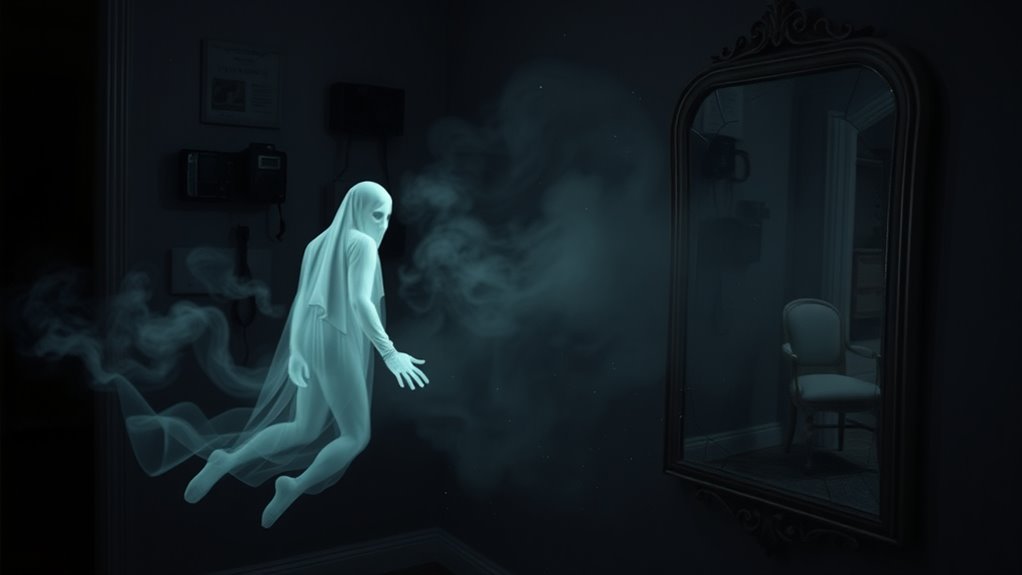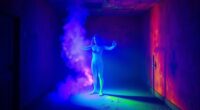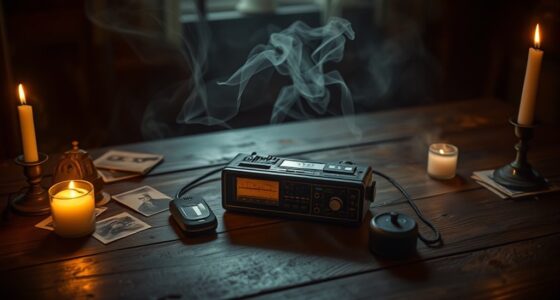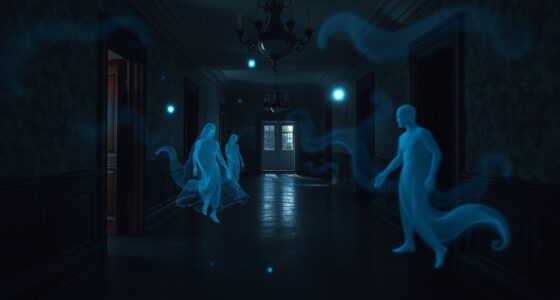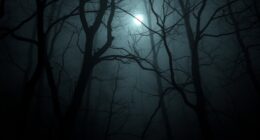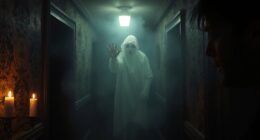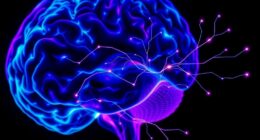When it comes to debunking common paranormal claims, it’s essential to understand that most such assertions lack strong empirical evidence. Psychological factors, environmental influences, and cultural misconceptions often distort perceptions. Your brain can misinterpret sensory experiences, especially in eerie settings, leading to false conclusions. Additionally, tools used in paranormal investigations can produce misleading results. Exploring these aspects further can shed light on the reality behind ghost sightings and help you think critically about the supernatural.
Key Takeaways
- Most paranormal claims lack empirical evidence, making it difficult to substantiate their existence scientifically.
- Psychological factors, such as fear and misinterpretation, often explain ghost sightings rather than actual supernatural phenomena.
- Environmental influences like temperature changes and electromagnetic fields can lead to sensory misinterpretations resembling paranormal activity.
- Limitations in paranormal investigation tools often result in false positives, questioning the validity of ghostly encounters.
- Cultural beliefs and media portrayals significantly shape perceptions of the paranormal, often overshadowing logical explanations.

When you plunge into the world of paranormal claims, you’ll quickly notice that most assertions lack solid empirical evidence, leaving the scientific community skeptical. Many people report ghost sightings or claim to have experienced unexplained phenomena, but these anecdotal accounts often fall short of providing the proof necessary to validate such experiences. Personal stories can be compelling, but they’re subjective and rely heavily on individual interpretation, making them inadequate for establishing the existence of paranormal activities.
You might find it intriguing that numerous ghost sightings can often be explained through psychological factors. Your brain can play tricks on you, especially in eerie settings like haunted locations. The mind can misinterpret shadows, sounds, or even the feeling of being watched due to heightened emotions or fear. In fact, understanding the supernatural realm can help clarify why individuals might perceive ordinary experiences as extraordinary.
Numerous ghost sightings can often be attributed to psychological factors, as heightened emotions can lead to misinterpretations of sensory experiences.
Environmental conditions also play a role; variations in temperature, humidity, or even electromagnetic fields can contribute to sensations that people attribute to supernatural forces. Therefore, what feels like a ghostly encounter may just be a natural occurrence misinterpreted by your senses.
Paranormal investigations often utilize technology like EMF meters and voice recorders, but these tools can produce false positives. Natural interferences can lead to misleading results, putting the claims of ghostly encounters into question.
Scientific explanations often reveal that the perceived evidence is more about the limitations of our equipment and interpretive frameworks rather than the existence of paranormal entities. Additionally, understanding misdiagnosis in mental health can help clarify how individuals may misinterpret their experiences as supernatural when they are actually linked to psychological conditions.
Cultural beliefs and media portrayals heavily influence how you perceive the paranormal. Movies and TV shows dramatize ghost stories, creating a lens through which many interpret their own experiences. This cultural framing can lead to misconceptions, as people might jump to supernatural conclusions before considering logical explanations. Often, the stories surrounding haunted locations are steeped in folklore and myth, further complicating the line between reality and fiction.
Frequently Asked Questions
Is There Any Real Evidence of Paranormal Activity?
You might wonder if there’s any real evidence of paranormal activity.
While many people share personal stories and experiences, these anecdotes don’t hold up to scientific scrutiny.
Despite numerous investigations, researchers haven’t found replicable results or objective evidence to support the existence of ghosts or supernatural phenomena.
Environmental factors often explain sensations people attribute to paranormal encounters.
Ultimately, without rigorous scientific validation, the claims remain unproven and largely speculative.
Did People Think Paranormal Activity Was Real?
Yes, people have historically thought paranormal activity was real. Many cultures have rich traditions and stories about ghosts and supernatural events, shaping their beliefs.
You’ll find that in various communities, personal experiences and anecdotes fuel these convictions. Even today, a significant percentage of adults in the U.S. report believing in ghosts, and countless spirit encounters are shared, highlighting a deep-rooted acceptance of the paranormal in society.
It’s a fascinating aspect of human experience.
Are There Real Paranormal Investigators?
Yes, there are real paranormal investigators. They use scientific methods and tools like cameras and EMF meters to explore claims of supernatural activity.
You’ll find that many of these investigators prioritize ethics, seeking consent from property owners and being transparent about their findings.
However, the scientific community remains skeptical, since extraordinary claims need extraordinary evidence.
Why Do People Believe in the Paranormal?
You believe in the paranormal for various reasons. Personal experiences often play a vital role, making you feel connected to something beyond the ordinary.
Cultural influences, like folklore and ghost stories, shape your perceptions and spark curiosity. Emotional states can also affect how you interpret events, leading you to see the supernatural in ambiguous situations.
Plus, social interactions with others who share similar beliefs reinforce your convictions, making the paranormal feel more real to you.
Conclusion
In the end, it’s amusing how we often chase shadows, convinced there’s more to the world than meets the eye. While the thrill of the paranormal can be enticing, remember that the real mysteries lie in the everyday—like figuring out where your missing sock vanished to! So, next time you hear a ghost story, just smile and nod, knowing that the true hauntings are probably just your own imagination running wild. Embrace the ordinary; it’s far more interesting!
